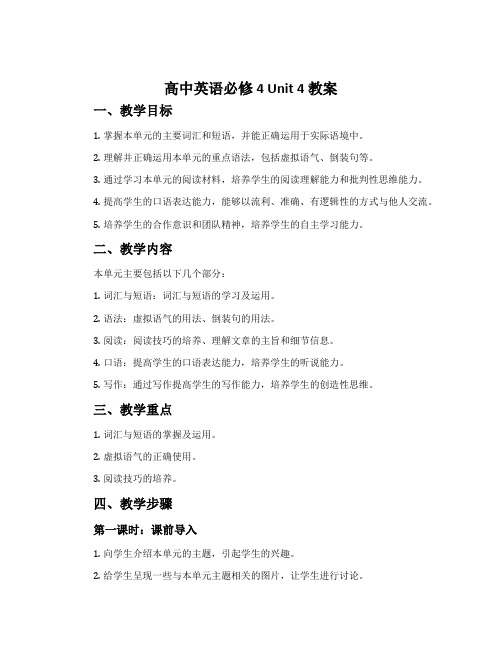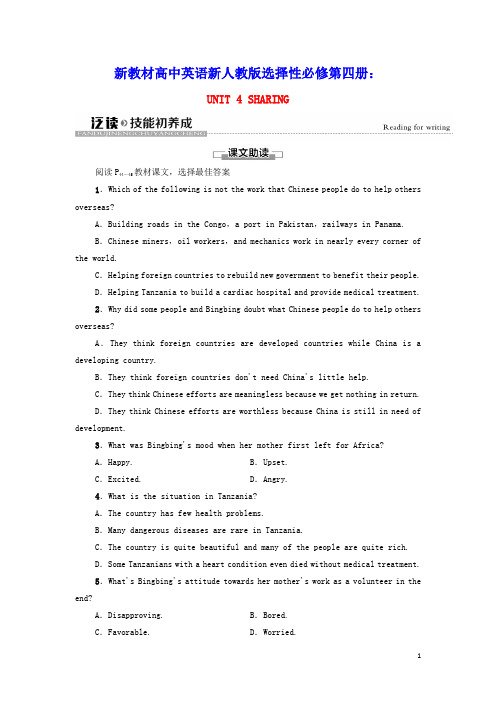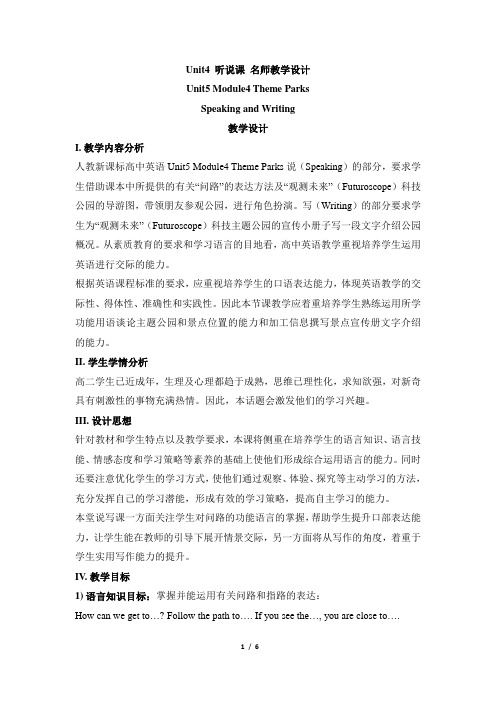高中英语必修四第四单元学案1
高中英语必修4Unit4教案

高中英语必修4 Unit 4 教案一、教学目标1.掌握本单元的主要词汇和短语,并能正确运用于实际语境中。
2.理解并正确运用本单元的重点语法,包括虚拟语气、倒装句等。
3.通过学习本单元的阅读材料,培养学生的阅读理解能力和批判性思维能力。
4.提高学生的口语表达能力,能够以流利、准确、有逻辑性的方式与他人交流。
5.培养学生的合作意识和团队精神,培养学生的自主学习能力。
二、教学内容本单元主要包括以下几个部分:1.词汇与短语:词汇与短语的学习及运用。
2.语法:虚拟语气的用法、倒装句的用法。
3.阅读:阅读技巧的培养、理解文章的主旨和细节信息。
4.口语:提高学生的口语表达能力,培养学生的听说能力。
5.写作:通过写作提高学生的写作能力,培养学生的创造性思维。
三、教学重点1.词汇与短语的掌握及运用。
2.虚拟语气的正确使用。
3.阅读技巧的培养。
四、教学步骤第一课时:课前导入1.向学生介绍本单元的主题,引起学生的兴趣。
2.给学生呈现一些与本单元主题相关的图片,让学生进行讨论。
3.向学生提出一个问题,引导他们思考本单元的学习目标。
第二课时:词汇与短语学习1.给学生呈现本单元的词汇和短语,帮助他们掌握词汇的拼写和词义。
2.进行词汇和短语的操练,包括填空、连线和造句等活动。
第三课时:语法学习1.介绍虚拟语气的基本概念和用法,帮助学生理解虚拟语气的意义和作用。
2.通过例句和练习,让学生掌握虚拟语气的具体用法。
第四课时:阅读技巧培养1.向学生介绍阅读技巧的重要性,引导他们了解如何提高阅读理解能力。
2.给学生呈现一篇有关本单元主题的阅读材料,让学生独立阅读并回答相关问题。
3.分析阅读材料的结构和语言特点,引导学生从不同角度理解文章的意义。
第五课时:口语表达能力培养1.给学生提供一些与本单元主题相关的情景,让学生进行角色扮演并进行对话练习。
2.引导学生用所学到的词汇和短语进行口语表达,改进他们的口语表达能力。
第六课时:写作能力培养1.向学生介绍本单元写作任务的要求和目标。
高中英语必修4 unit 4 阅读和写作教学案

PeriodIII Reading and writingTeaching aims: 1.understanding the new text to train the reading ability of the students2. 德育目标: 了解不同文化背景下人们的身体语言,学习使用恰当的身体语言进行交流。
I. Preparation for the text before class by oneself.★课文重点句子翻译1. 你不愿使老板失望,况且这对你是一次令人兴奋的经历,因此你站在一旁,观看着,倾听着。
_______________________________________________________________2. They will be meeting at a major hotel with local business people who represent the Chinese government._______________________________________________________________3. 不是所有人都以同样的方式寒暄。
接触陌生人时,距离太远太近都会使他们不舒服。
_______________________________________________________________4. Four people enter looking around in a curious way._______________________________________________________________5. 从西班牙,意大利或者南美洲国家来的人近距离接近对方,而且可能会用身体接触对方。
_______________________________________________________________6. 现在世界上多数人见面要握手相互问候,但有些文化背景下的人会采取另一些寒暄方式。
[高中英语]高中英语必修四《Unit 4》导学案
![[高中英语]高中英语必修四《Unit 4》导学案](https://img.taocdn.com/s3/m/1353be45b9f3f90f76c61be6.png)
3. Enjoy the beauty of English with a strong passion.一、常考词汇细点拨1.represent vt.代表;象征;表现;描写;描绘;声称②She ______________________ the kindest mother in the world.她把她的妈妈描绘成世界上最好的母亲.④__________________ resettled people, I support the construction of the project.作为移民代表,我支持该项目的建设.2.curious adj.好奇的curiously adv.好奇地③___________________, he pulled down the handle of the fire alarm.出于好奇,他把火警器的手把拉了下来.[链接高考]__________3approach vt.& vi.接近;靠近;找……商量n.接近;方法;途径;步骤;通道③The job market has changed and our __________________ must change aswell.就业市场变了,我们找工作的途径也要改变.根据提示写出下面“(做)……的方法”的正确搭配.①the approach_____________ sth.②the way ______________ sth.③the means ____________ sth.④the method ____________ sth[链接高考](2010·上海高考改编) _______________________,we saw a stone statue of about 10 meters in height. (approach)接近市中心时,我们看到一座大约十米高的石像.4.defend vt.保护;保卫;辩护②Some think that students should be trained ___________________ some attacks.有些人认为应该训练学生保护自己免遭某些攻击.[单词对点集训]Ⅰ.多项选择1._____2._____3._____4._____5._____Ⅱ.多维演练(练得更细、更全、更彻底!)1.approach点点练(1)完成句子①____________________________,our class decided to hold a party tocelebrate the important day for a change this year.(approach)随着教师节的临近,今年我们班决定换一种方式举行一场晚会来庆祝这个重要的节日.②They are said to have develop ed________________________which is boundto improve c lassroom teaching greatly.(approach)据说他们已研发了一个新的教学方法,这个方法注定会大大提高课堂效果.(2)_____2.curious面面观(1)完成句子①___________________ that drove me to open the case.(curiosity)是好奇心驱使我打开盒子.②I turned around and they were still standing there, _________________.(curious)我转过身去,他们仍站在那里,想为我送行. (2)______1.in general 总的来说;通常②________________,the number of the people who drive after drinking issmaller and smaller.总体来说,酒后开车的人的数量越来越少.请完成下列表示“总而言之”的其他表达.①all___all②____a word ③___ the whole ④___ sum up⑤___ brief ⑥___ a nutshell ⑦___ conclusion ⑧___ conclude2.lose face 丢脸;失面子③_____________________,they never give up but try their best to find a way out.面对困难时,他们从不放弃而是努力寻找出路.3.at ease舒适;快活;自由自在②When you feel nervous, you’d better listen to some light music to ___________.当你感到紧张时,你最好听些轻音乐使自己放松一下.[短语对点集训]1._________2._________3._________4.________5.________Ⅱ.多项选择 1.____2.____3.____4.____1.The first person to_arrive was Tony Garcia from Colombia, closely followed by Julia Smith from Britain.第一个到达的是从哥伦比亚来的托尼·加西亚,随后紧跟着的是英国的朱莉娅·史密斯. t o arrive是不定式作后置定语.③—The last one__________ pays the meal.—Agreed!——最后一个到的请客.——同意!④The ability ___________ an idea is as important as the idea itself.表达思想的能力和思想本身一样重要.2.However, people from places like Spain, Italy or South American countries approach others closely and are more likely_to touch them.但是,来自像西班牙、意大利或南美等国家的人会站在离别人很近的地方,而且很可能(用身体)接触对方.(1)Sb./Sth.be likely to do sth.=It’s likely that ...“做某事是可能的”.②Students should listen more to their classmates, thus they will help a nd learnfrom each other, and a friendship _____________________.学生应该多听同学的,因此他们有可能相互帮助相互学习,并且友谊有可能形成. [链接高考]______[句型对点集训] 完成句子1.If you can find suitable learning methods, your learning efficiency __________(likely)如果你能找到适当的学习方法,你的学习效率有可能提高.2.Yi Siling was the first athlete___________ in the 2012 London Olympic Games.(win)易思玲是第一位在2012年伦敦奥运会上获得金牌的运动员.3.(2014·湖北省孝感高三调研)_________________________there is a small cha nce that a large scale war will break out between Ch ina and Japan.(judge) 根据目前的形势判断,中日之间爆发大规模战争的可能性很小.4._________________ the novel, he didn't realize the approach of the teacher.(occupy)专注于读小说,他没有意识到老师走近了.5.(2014·武昌调研)I don't agree that they should return the treasure to Russia._______________that they should give it to any government.(nor)我既不同意他们将这笔财富归还给俄国,我也认为他们不应该将它送给任何政府. 考,安排好展示和点评的同学.3. 非展示同学在作文纸上认真写作.4. 非展示的同学写完之后查看黑板上内容请同学们结合高考题,分析本单元重难点词汇的考点,提升综合运用能力. 请将疑难题目总结到典型题本上.【达成目标】:A层准确无误,灵活运用上本节课所学,能使用高级句;B层基本准确,灵活运用上本节课所学;C层基本准确,灵活运用上本节课所学的大部分内容.【巩固落实】分层达标:A层:能牢固记忆所有句子并能用多种方式表达;B层:能牢固记忆所有句子(;C层:能牢固记v.-ing形式作定语和状语完成句子1.(2014·黄冈中学高三模拟)Not _____________________,many animals died fromstarvation in the search of new grassland.(eat)没有足够的食物可吃,许多动物在寻找新草地过程中饿死了.2.The snow lasted three days, ______ serious traffic confusion in the wholecity.(result)这场雪持续了三天,造成全市严重的交通混乱.3.Strong measures have been taken by the government, _________________goingup too rapidly.(prevent)政府已采取严厉措施,以阻止房价上升过快.4.Hearing the news, he rushed out of the classroom, ___________ in the table.(leave)听到消息后,他冲出教室,把书摊放在书桌上.5.We are excited that a satellite____________ was successfully placed in orbityesterday.(weigh)昨天重十吨的人造卫星被成功送入轨道,为此我们兴奋不已.检测练习I.汉译英1.陈述,说明_______2.社团,联系,联想________3.主要的______4.误解,误会v._______5.非口语的______6.等级,军衔_________7.防御,保卫n.________8.好奇的________9.迎接,问候______ 10食堂________11..飞行,航班_______12..面部的________13.宿舍_________14.怒气,怒火________15.打呵欠__________ II.必背句型1.I saw several young people enter the waiting area__________________. (look)我看见几个年轻人进入等候区好奇的环顾四周.2.She stepped back _____________and put up her hands,as if in defence. (appear)她似乎惊讶的往后退然后抬起手好像保卫自己.3.__________________people is subjective,base d on each culture,but in general it is probably not a good idea to give a hug to a boss or teacher. (respectful)尊敬别人是主观的,建立在每种文化基础之上,但是一般来说拥抱老板或老师可能不是很好的想法.学贵有疑——我思考,我收获!学习建议:结合以上学习,请你用3-5分钟的时间与同学自由质疑和答惑.。
新教材高中英语UNIT4SHARING泛读技能初养成学案新人教版选择性必修第四册

新教材高中英语新人教版选择性必修第四册:UNIT 4 SHARING阅读P44-45教材课文,选择最佳答案1.Which of the following is not the work that Chinese people do to help others overseas?A.Building roads in the Congo,a port in Pakistan,railways in Panama.B.Chinese miners,oil workers,and mechanics work in nearly every corner of the world.C.Helping foreign countries to rebuild new government to benefit their people.D.Helping Tanzania to build a cardiac hospital and provide medical treatment.2.Why did some people and Bingbing doubt what Chinese people do to help others overseas?A.They think foreign countries are developed countries while China is a developing country.B.They think foreign countries don't need China's little help.C.They think Chinese efforts are meaningless because we get nothing in return.D.They think Chinese efforts are worthless because China is still in need of development.3.What was Bingbing's mood when her mother first left for Africa?A.Happy. B.Upset.C.Excited. D.Angry.4.What is the situation in Tanzania?A.The country has few health problems.B.Many dangerous diseases are rare in Tanzania.C.The country is quite beautiful and many of the people are quite rich.D.Some Tanzanians with a heart condition even died without medical treatment.5.What's Bingbing's attitude towards her mother's work as a volunteer in the end?A.Disapproving. B.Bored.C.Favorable. D.Worried.[答案] 1-5 CDBDCWords and Phrases知识要点1 resign vi.& vt.辞职;辞去[教材原句P40]One of my dreams is to work in Africa and continue to help the disabled after I resign from my job.我的一个梦想是在非洲工作,在我辞职后继续帮助残疾人。
新课标人教版高一英语必修四unit4教案

新课标人教版高一英语必修四 Unit 4 教案教学目标1.了解 Unit 4 主题是“小说和电影”,并学会掌握相关词汇和知识;2.学习阅读文学作品的技巧和方法;3.提高听力和口语能力,能够听懂和表述有关电影和小说的内容;4.培养学生的批判性思维能力。
教学内容本单元的教学内容主要包括以下四部分:1.Introduction & Reading: Introducing Literature and Films2.Listening & Speaking: Films and Novels3.Speaking & Writing: Discussing Favourite Filmsnguage study: Modal Verbs教学过程Introduction & Reading1.学生们在老师的带领下,讨论并了解本单元的主题和学习目标;2.学生们分组阅读一篇有关文学和电影的文章,并在小组内讨论文章的主要观点和结论;3.整个班级讨论文章的内容,并展示各个小组的不同观点。
Listening & Speaking1.给学生播放一段电影片段,并让他们在听完后就内容进行讨论和总结;2.给学生发放一份包括电影和小说内容的练习,并让学生用口语和同桌一起完成练习。
Speaking & Writing:1.学生被分成小组,每组产生一个代表,代表需要先介绍自己喜欢的电影,并谈论电影中的某些特点和值得推荐的原因;2.所有代表回到教室,并通过细节和观点进行辩论;3.接下来,学生们需要写一篇有关一部电影、小说或者文化作品的作文,并将这篇作文与同桌进行分享和讨论。
Language study本单元的语言学习环节将主要集中在Modal Verbs语法和习惯用法上。
学生需要通过阅读和翻译文本,以及完成会话练习和语言表达作业来掌握这一难点。
教学评估1.通过小组讨论和全班讨论来听取学生的观点和意见;2.通过听力和口语练习来检查学生的听力和口语能力;3.通过作文和语法作业来检测学生对知识点的掌握情况。
人教课标版高中英语必修4 Unit4_听说课_名师教学设计

Unit4 听说课名师教学设计Unit5 Module4 Theme ParksSpeaking and Writing教学设计I. 教学内容分析人教新课标高中英语Unit5 Module4 Theme Parks 说(Speaking)的部分,要求学生借助课本中所提供的有关“问路”的表达方法及“观测未来”(Futuroscope)科技公园的导游图,带领朋友参观公园,进行角色扮演。
写(Writing)的部分要求学生为“观测未来”(Futuroscope)科技主题公园的宣传小册子写一段文字介绍公园概况。
从素质教育的要求和学习语言的目地看,高中英语教学重视培养学生运用英语进行交际的能力。
根据英语课程标准的要求,应重视培养学生的口语表达能力,体现英语教学的交际性、得体性、准确性和实践性。
因此本节课教学应着重培养学生熟练运用所学功能用语谈论主题公园和景点位置的能力和加工信息撰写景点宣传册文字介绍的能力。
II. 学生学情分析高二学生已近成年,生理及心理都趋于成熟,思维已理性化,求知欲强,对新奇具有刺激性的事物充满热情。
因此,本话题会激发他们的学习兴趣。
III. 设计思想针对教材和学生特点以及教学要求,本课将侧重在培养学生的语言知识、语言技能、情感态度和学习策略等素养的基础上使他们形成综合运用语言的能力。
同时还要注意优化学生的学习方式,使他们通过观察、体验、探究等主动学习的方法,充分发挥自己的学习潜能,形成有效的学习策略,提高自主学习的能力。
本堂说写课一方面关注学生对问路的功能语言的掌握,帮助学生提升口部表达能力,让学生能在教师的引导下展开情景交际,另一方面将从写作的角度,着重于学生实用写作能力的提升。
IV. 教学目标1) 语言知识目标:掌握并能运用有关问路和指路的表达:How can we get to…? Follow the path to…. If you see the…, you are close to….了解宣传小册子文字介绍的功能、结构和内容。
Unit 1-4 单词背诵+默写学案-高中英语牛津译林版(2020)选择性必修第四册
选择性必修四Unit 1单词表(默写版)姓名________学习指导:1.大声朗读单词至熟练;2.对照汉字默写单词并订正;3.及时复习单词并反复默写。
1.______ adv.刚好;仅仅,勉强可能;几乎不;刚才(2)2.______ n.雪茄烟(2)3.______ n.约定,约会,任命,委托;职务(2)4.______ 拆毁,拆除(2)5.______ adj.灵敏的,敏锐的;渴望,热切,热衷于(2)6.______ n.颌,下巴(2)7.______ n.伤疤;(精神)创伤;污点(2)8.______ n.眉毛9.______ n.领带别针,围巾夹(2)10.______ n.钻石(2)11.______ 成功立业,发财(2)12.______ 失去联系(2)13.______ adj.可信赖的;真实可信的,可靠的(2)14.______ adj.值得花时间(或花钱、努力等),重要的,令人愉快的(2)15.______ n.衣领,颈圈;圈,箍(3)16.______ vt.祝福(3)17.______ n.英寸;少量,短距离(3)18.______ 臂挽着臂(3)19.______ vt.概述,略述n.概述;轮廓线,略图(3)20.______ vt.& vi.怀疑n.嫌疑犯,可疑对象(3)21.______ n.& vt.逮捕,拘捕(3)22.______ 被逮捕(3)23.______ vt.给(某人)打电报;接通电源n.金属丝;电线;铁丝网(3)24.______ n.罪犯adj.犯法的;刑事的;不道德的(3)25.______ adv.不过,总之;尽管如此;而且;随便地(3)26.______ adj.无辜的,清白的,无罪的;天真无邪的,纯真的n.无辜者,单纯的人(5)27.______ adj.合法的;法律的(5)28.______ n.道德原则;法则;信条(5)29.______ adj.正派的,合乎礼节的;得体的,适当的(5)30.______ n.(责任、义务等的)重担,负担(6)31.______ n.地球物理学家(6)32.______ adj.核心的n.核心,最重要的部分(6)33.______ adj.社会主义的n.社会主义者(6)34.______ vt.& vi.辞职,辞去(6)35.______ n.病房(6)36.______ adj.大量的,价值巨大的;结实的,牢固的(6)37.______ n.矿物,矿物质(6)38.______ adj.极佳的,卓越的,质量高的(7)39.______ n.摄影师,拍照者(7)40.______ adj.感到内疚;有罪的,有过失的(7)41.______ adj.惭愧,羞愧,尴尬(7)42.______ vt.& vi.原谅,宽恕,免除(债务)(7)43.______ vt.欺骗,蒙骗vi.作弊,舞弊(7)44.______ vt.包,裹n.披肩,围巾;包裹材料(8)45.______ n.包裹,小包;一块地vt.裹好,打包(8)46.______ n.蝴蝶结vi.鞠躬(8)47.______ n.侄子,外甥(8)48.______ n.皱纹;皱痕vt.起皱纹,皱起;起褶皱(8)49.______ vi.停顿,暂停n.停顿,停顿的时间(8)50.______ vi.& vt.缝,做针线活;缝上(8)51.______ vi.& vt.假装;装扮,扮作;自诩,自认为(8)52.______ n.荣幸;特殊利益vt.特别优待(11)53.______ vt.& vi.欣然接受;包含;拥抱(11)54.______ n.阶段,时期(11)55.______ n.锚;给以安全感的人(或物)vi.& vt.抛锚;使固定(11)56.______ n.仁慈,宽恕(11)57.______ 任…处置,对…无能为力(11)58.______ adv.同样地;也,而且(11)59.______ n.最后期限,截止日期(11)60.______ n.指导;导航(11)61.______ n.过错,责任;弱点,缺点(11)62.______ n.美德;正直的品性;优点(11)63.______ n.诚实正直;完整,完好(12)64.______ adj.有机的,统一的;绿色的;生物的(12)65.______ n.海星,星鱼(12)66.______ adj.灰心的,泄气的(12)67.______ n.垃圾;废话(12)68.______ n.节省物,节省,储蓄金(12)69.______ n.意外收获,奖金,红利(12)70.______ 使焦虑不安,加重…的思想负担(12)71.______ n.玉,碧玉(12)72.______ vt.& vi.播种,种(12)73.______ n.收成,收获量;收获季节,收割vt.& vi.收割,捕猎(12)74.______ vi.非常高兴,深感欣喜(13)75.______ n.引语,原话vt.& vi引用,引述;举例说明(13)选择性必修四Unit 1单词表(背诵版)姓名________学习指导:1.大声朗读单词至熟练;2.对照汉字默写单词并订正;3.及时复习单词并反复默写。
【原创】导学案必修四 Unit4 (Period 4 Showing our feelings)
导学案Unit 4 Body LanguagePeriod 4 Showing our feelings课文原文SHOWING OUR FEELINGSBody language is one of the most powerful means of communication, often even more powerful than spoken language. People around the world show all kinds of feelings, wishes and attitudes that they might never speak aloud. It is possible to "read" others around us, even if they do not intend for us to catch their unspoken communication. Of course, body language can be misread, but many gestures and actions are universal.The most universal facial expression is, of course, the smile –its function is to show happiness and put people at ease. It does not always mean that we are truly happy, however. Smiles around the world can be false, hiding other feelings like anger, fear or worry. There are unhappy smiles, such as when someone "loses face" and smiles to hide it. However, the general purpose of smiling is to show good feelings.From the time we are babies, we show unhappiness or anger by frowning. In most places around the world, frowning and turning one's back to someone shows anger. Making a fist and shaking it almost always means that someone is angry and threatening another person.There are many ways around the world to show agreement, but nodding the head up and down is used for agreement, almost worldwide. Most people also understand that shaking the head from side to side means disagreement or refusal.How about showing that I am bored? Looking away from people or yawning will, in most cases, make me appear to be uninterested. However, if I turn toward and look at someone or something, people from almost every culture will think that I am interested. If I roll my eyes and turn my head away, I most likely do not believe what I am hearing or do not like it.Being respectful to people is subjective, based on each culture, but in general it is probably not a good idea to give a hug to a boss or teacher. In almost every culture, it is not usually good to stand too close to someone of a higher rank. Standing at a little distance with open hands will show that I am willing to listen.With so many cultural differences between people, it is great to have some similarities in body language. We can often be wrong about each other, so it is an amazing thing that we understand each other as well as we do!I.自学单词(employee ~ cassette)II.写出下列单词和短语1.adj.口语的→adj.非口语的;未说出口的2.n.作用;功能;职能vi.起作用;运转3.adv.真实地;真诚地;真正地4.adj.错误的;假的5.n.怒气;怒火→adj.生气的6.adj.主观的→n.主题;对象7.n.等级;军衔8. lose 丢脸9.watch/look 小心课堂检测I. Divide the passage into three parts and match the main idea with each part.Part 1 (Para.1)Part 2 (Para.2-6)Part 3 (Para 7)A. Examples of some body language.B. There are differences in body language, and it’s important for us to know them.C. Body language is sometimes more important than spoken language.II. Decide which of the sentences are true or false.1. Body language is never as powerful as spoken language.2. If you are angry at a person, you might turn your back to him or her.3. You can threaten a person by refusing to speak.4. You should not greet your new boss by giving her or him a hug.5. Body language is the same all over the world.6. Most people can understand each other if they try.当堂测试Read the passage and then choose the best answers according to the passage.1.Which of the following about body language is True?A. It’s more important than spoken language.B. It’s as important as spoken language .C. It’s not as important as spoken language.D. It’s less important than spoken language.2.Why may a person smile if he loses face?A. To show his anger.B. To hide his embarrassment.C. To threaten others.D. To laugh at others.3.If you are not interested in other s’ talking, you may .A. look away from him or yawn.B. turn toward and look at something.C. fix your attention on the speakerD. stand at a little distance with open hands4. Suppose you are a teacher in America, you’ll tell your students to when others are talking.A. avoid looking at others directly.B. look directly at othersC. glance at othersD. look down at others5. We can infer from the text that .A. we can communicate successfully with others using body language.B. people from different countries will not misunderstand each other using body language.C. we should try to learn more about other countries’ customs.D. all around the world, people express the same ideas using the same body language单元词汇专项三一、基础单词、短语默写1.vi.皱眉________2. adj.错误的;假的_______3 adv.真实地;真诚地;真正地______4.n.磁带_______5.n怒气、怒火_______6.n.作用;功能;职能vi.起作用;运转_______7.vt.减轻(痛苦、忧虑)n.安逸;舒适_______8.n.雇员_______9.adj.主观的_______10..adj面部的_______ 11.vt.读错;误解________12.adj恭敬的_______13.n.拳头_______14.vi.打呵欠________15.n.等级;军衔________16.vi.&vt.拥抱________17.舒适;快活;自由自在________18.丢脸________19.背对;背弃_________20.小心;当心_______二词汇运用一)单词拼写1.The ________(功能;作用)of the heart is to pump blood through the body.2.I’m ________(真诚地)grateful.3.A literary critic should not be too ________(主观的)in his approach.4.It is not usually good to stand too close to someone of a higher ________(阶层;等级).5.The most universal ________(面部的)expression is the smile.二)完成句子1.握紧拳头并摇晃它总是意味着某个人很生气。
高中英语人教版必修四教学案:Unit4Section4含答案
答案:1~3Ⅰ.Matchthemainideawitheachpart .1.Part1(P ara . 2.Part2(Paras . 1) 2~6) A .Examplesofsomeuniversalbodylanguage . B .Bodylanguageissometimesmoreimportantthanspokenlanguage .3.Part3(Para .7) C .Therearedifferencesinbodylanguage,andit'simportantforustoknowthem .BACⅡ.Readthepassagecarefullyandchoosethebestanswers .1.WhichofthefollowingaboutbodylanguageisTRUE?A .Itismoreimportantthanspokenlanguage .B .Itisasimportantasspokenlanguage .C .Neitherspokenlanguagenorbodylanguageisimportant .D .Itislessimportantthanspokenlanguage .2.Whymayapersonsmileifhelosesface?A .Toshowhisanger .B .Tohidehisembarrassment .C .Tothreatenothers .D .Tolaughatothers .3.Ifyouarenotinterestedinothers'talking,youmay________ .A .lookawayfromhimoryawnB .turntowardandlookatsomethingC .fixyourattentiononthespeakerD .standatalittledistancewithopenhands4.SupposeyouareateacherinAmerica,you'lltellyourstudentsto________whenothersaretalking .A .avoidlookingatothersdirectlyB .lookdirectlyatothersC .glanceatothersD .lookdownatothers5.Wecaninferfromthetextthat________.A .wecancommunicatesuccessfullywithothersusingbodylanguageB .peoplefromdifferentcountrieswillnotmisunderstandeachotherusingbodylanguageC .weshouldtrytolearnmoreaboutother countries'customsD .allaroundtheworld,peopleexpressthesameideasusingthesamebodylanguage 答案:1~5BBABCⅠ.单词拼写1.Themachinewon'tfunction(运行)properlyifyoudon'toilitwell .2.Shegavefalse(虚假的)informationtotheinsurancecompany .3.Themanwasshakinghisfist(拳)atusthroughthewindow.4.Theyhugged(抱)eachotherwhentheymetatthestation.5.Theyarepeopleofallranks(等)andclasses.6.Igavehimsomemedicinetoease(减)thepain.7.IfeltsosleepythatIcouldn'tstopyawning(打呵欠).8.Asacritic,hiswritingisfartoosubjective(主的).Ⅱ.拓展1.facialadj.面部的→facen.面部;2.trulyadv.真地;真地;真实地→trueadj.真的;真实的3.angern.怒气;怒火→angryadj.生气的;火的4.respectfuladj.恭顺的→respect v.&n.敬爱;恭顺5.easen.安适;舒坦vt.减(难过,)→easyadj.简单的[巧]派生Ⅲ.全短例facialtrulyangry律n.+-ial→adj.adj.+-ly→adv.n.+-y→adj.1.atease舒坦;快活;逍遥自在2.loseface3.turnone'sbackto背;背弃4.giveahugtosb.抱某人5.nodthehead点点6.berespectfultosb.敬爱某人7.upanddown上上下下;来往返回8.lookawayfrom把眼光从⋯⋯上移开;不看9.inmostcases在大部分状况下1.[教材原句]Itispossibleto“read〞others even around if us,theydonotintendforusto catchtheirunspokencommunication.“懂〞我周人的心思是有可能的,即使他其实不想我捕获到他没有出来的信息。
高中英语必修4Unit4教案.doc
高中英语必修4Unit4教案unit 4 body languagei.单元教学目标技能目标 skill goalstalk about body language: cultural differences and intercultural communicationpractise talking about prohibition & warning as well as obligationlearn to use the -ing form as the attribute&adverbiallearn to write a diary that showing the observation of how body language helps in communicationii.目标语言功能句式 talk about body languagewhat is the purpose of language?what do you think “body language” means?how can you tell if someone is sad or happy even if they do not speak?how can you communicate a feeling to someone who does not speak your language?why do we need to study body language?talk about cultural differences & intercultural communicationwhat do british people often do when they meet strangers?what do french people often do when they meet people they know?why should we be careful about our own body language? why is it important to watch others as well as listen to them?词汇 1.四会词汇 represent, association, canteen, dormitory, flight, curious, approach, major, misunderstand, dash, adult, crossroad2.认读词汇 unspoken,, jordan3.词组be likely to, in general, not all, turn one’s back to, lose face语法 4.重点词汇represent, introduce, approach, touch, express, nod, avoid, misunderstand, punish, general, curious, similar, expression, agreement, gesture, actionthe -ing form as the attribute && adverbialfinding out in the reading text sentences with present participle(s) used as the attribute or adverbial.1. the -ing form as the attributethey are visitors coming from several other countries, ...his nose touches mr. cook’s moving hand, ...this is an exciting experience for you, ...2. the -ing form as the adverbial... so you stand watching and listening.four people enter looking around in a curious way.you see her step back appearing surprised, and take a few steps away from mr. garcia.the visitor from japan comes in smiling at the same time as george cook from canada.ⅲ.教材分析和教材重组1.教材分析本单元以body language——“体态语”为中心话题,具体涉及什么是“体态语”,如何理解“体态语”,以及“体态语”的跨文化性等。
- 1、下载文档前请自行甄别文档内容的完整性,平台不提供额外的编辑、内容补充、找答案等附加服务。
- 2、"仅部分预览"的文档,不可在线预览部分如存在完整性等问题,可反馈申请退款(可完整预览的文档不适用该条件!)。
- 3、如文档侵犯您的权益,请联系客服反馈,我们会尽快为您处理(人工客服工作时间:9:00-18:30)。
Unit 4 Body language 学案1
词汇感知写出下列单词及相关转换形式
1.n.陈述;说明→vt.
2.vi.& vt.迎接;问候→n.
3.vt.代表;象征→n.代表;代理4.n.社团;联系;联想
→vt.把(不同的人或事物)联系在一起
5.n.宿舍
6.adj.好奇的→adv.好奇地→n. 7.vt.& vi.接近;靠近;走近n.接近;方法;途径8.n.面颊
9.vt.保护;保卫→n.防御;保卫10.vt.误解;误会→n.误解;误会11.vi.猛冲;突进
12.adj.可能的
13.n.作用;功能;职能vi.起作用;运转→adj.功能的14.n.安逸;舒适vt.减轻(痛苦、忧虑)
15.n.怒气;怒火
16.adj.主观的→adv.主观地→adj.客观的17.vi.& vt.拥抱
18.n.等级;军衔
重点短语
1.保卫……以免受
2.很可能……;有希望……
3.总的来说;通常
4.舒适;快活;自由自在
5.丢脸
6.背对;背弃
7.对……感到好奇
【当堂检测】语境活用(用单词的正确形式填空)
1. The PRC ________(代表) the People’s Republic of China .
2. They live in the same ________(宿舍).
3. At noon ,students are in the _______(食堂) for lunch .
4. Their _______(航班) number is 9573.
5. Children are _______(好奇) about everything .
6. A tourist _______(接近) us and asked us the way to Windsor Castle .
7. Their ________(好奇) is good for their future development .
8. Tears rolled down his ________(面颊).
9. The surgeon is doing a ______(主要的) operation .
10.There are different _______(方法) to language learning .
11.He _______(误解) his partner and glared at him.
12.The film is intended for _______(成人) .
13. The most universal _______(面部的)expression ,of course ,the smile .
14. The machine ________(运转) well .
15. There has been a close ______(联系) between these two companies .
16. He________(迎接/问候)all the guests warmly as they arrived.
17. She gave her son a________(拥抱)and let him go to bed.
学案1当堂检测答案:1.represents/stands for 2.dormitory 3.canteen
4.flight
5.curious
6.approached
7.curiosity
8.cheeks
9.major
10.approaches 11.misunderstood 12.adults 13.facial 14.functions
15.association 16.greeted 17.hug
【学后记】:。
